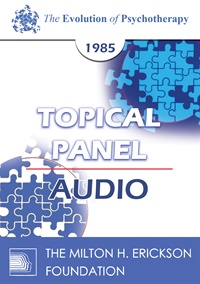EP85 Panel 02 - Group, Individual, or Family Therapy I - Mary M. Goulding, MSW; Virginia Satir, ACSW; Paul Watzlawick, PhD; Jeffrey K. Zeig, PhD
- Average Rating:
- Not yet rated
- Topic Areas:
- Topical Panels | Family Therapy | Group Therapy | Psychotherapy | Systems Thinking
- Categories:
- Evolution of Psychotherapy | Evolution of Psychotherapy 1985 | Pioneers in Couples and Family Therapy
- Faculty:
- Mary Goulding, MSW | Virginia Satir, MA, ACSW | Paul Watzlawick, PhD | Jeffrey Zeig, PhD
- Duration:
- 56 Minutes
- Format:
- Audio Only
- Original Program Date:
- Dec 11, 1985
- License:
- Never Expires.
Description
Description: This panel examines different therapeutic approaches by discussing how individual, family, and group therapy can address psychological challenges. Expert faculty share insight on understanding context, changing relational patterns, and adapting therapeutic techniques to meet unique client needs. The conversation highlights the importance of flexibility, systemic thinking, and innovative interventions in modern psychotherapy.
Moderated by F Theodore Reid, Jr, MD.
Educational Objectives:
- To compare and contrast clinical and philosophical perspectives of experts.
*Sessions may be edited for content and to preserve confidentiality*
Credits
Handouts
| Timestamped Transcript (801.7 KB) | 18 Pages | Available after Purchase |
| Ericksonian Learning Snapshot (250.4 KB) | 2 Pages | Available after Purchase |
Faculty
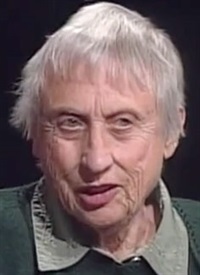
Mary Goulding, MSW Related Seminars and Products
Mary Goulding, MSW, is one of the leading exponents of Transactional Analysis. Along with her husband Robert Goulding, she developed an approach called Redecision therapy which synthesizes Transactional Analysis and Gestalt. Together they founded the Western Institute for Group and Family Therapy in Watsonville, California, and co-authored two professional books about their approach. There is also an edited volume about the Redecision model. Mary has served as a member of the Board of Trustees of the International Transactional Analysis Association and is a Teaching Member of that organization. Her M.S.W. was granted in 1960 from the School of Social Welfare, University of California, Berkeley.
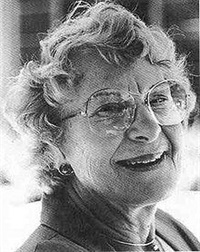
Virginia Satir, MA, ACSW Related Seminars and Products
For almost forty years, Virginia Satir has practiced and taught psychotherapy. One of the founders of family therapy, she has co-authored four books and authored five. Additionally, there are a number of books about her approach. She was recipient of the Distinguished Family Therapy Award from the American Association of Marriage and Family Therapy.
Satir wass the co-founder of the Mental Research Institute. She wass past president of the Association of Humanistic Psychology and has a number of honorary doctorates. Her master's degree was granted in 1948 from the University of Chicago School of Social Service Administration.
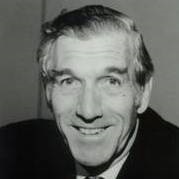
Paul Watzlawick, PhD Related Seminars and Products
Paul Watzlawick, received his Ph.D. from the University of Venice in 1949. He has an Analyst's Diploma from the C.G. Jung Institute for Analytic Psychology in Zurich. Watzlawick has practiced psychotherapy for more than 30 years. He was research associate and principal investigator at the Mental Research Institute. He was Clinical Professor at the Department of Psychiatry and Behavioral Sciences, Stanford University Medical Center. Watzlawick is a noted family therapist; he is recipient of the Distinguished Achievement Award from the American Family Therapy Association. Also, he is author, co-author or editor of eight books on the topics of interactional psychotherapy, human communication and constructivist philosophy.
He formulated five axioms. They are:
- It is not possible to not communicate. Every behavior is some kind of non-verbal communication.
- Every communication has a content. In addition, there is 'metainformation', which says how the communicator wants to be understood.
- All partners involved in a communication process also interpret their own behaviour during communication.
- Human communication involves both verbal and non-verbal communication. In addition to the spoken words, there are is also a non-spoken part (gestures, behavior, intonation..) which is part of the communication.
- Communication between humans is either symmetric or complementary. This is based on whether the relationship of those communicating is based on differences or parity.
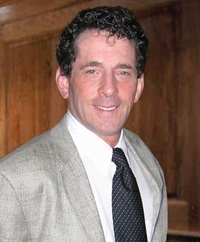
Jeffrey Zeig, PhD Related Seminars and Products
Jeffrey K. Zeig, PhD, is the Founder and Director of the Milton H. Erickson Foundation and is president of Zeig, Tucker & Theisen, Inc., publishers in the behavioral sciences. He has edited, co-edited, authored or coauthored more than 20 books on psychotherapy that appear in twelve foreign languages. Dr. Zeig is a psychologist and marriage and family therapist in private practice in Phoenix, Arizona.


